Based in Stockholm, Skanska Commercial Development Europe counts among the biggest Real Estate Development company in Europe. Skanska owns Business Link, a fast growing coworking brand in Central and Eastern Europe (CEE), currently operating 5 locations, in Poland and in the Czech Republic. We have interviewed Jaroslaw Bator, Managing Director at Business Link & Business Development Director. Jaroslaw will be a speaker at the upcoming Coworking Europe 2019 conference, to take place in Warsaw, on November 13-15.
Hi Jaroslaw. Can you introduce Business Link to us?

Jarosław Bator
The Business Link brand was created in 2011, based on the Academic Entrepreneurship Incubator Foundation – an NGO supporting Polish entrepreneurship. The growing scale of the project sparked Skanska’s interest, which in 2017 together with the Foundation as a joint venture, developed the concept much more boldly and directed it to professionals, who expect the best locations, a chique design and perfect customer service. Currently, Business Link is a brand wholly owned by Skanska, an unparalleled model of cooperation between a key developer and an operator of flexible work spaces.
You have plans to open up a total of 50.000 sqm of coworking space in Central Europe. Is the region ready to absorb such an increase?
The attractiveness of the CEE region has already attracted many players in the flexible work space sector. We are slowly beginning to observe market segmentation. We found our niche within – remarkably designed and operated spaces. Therefore, at present, our priority is to further professionalize our current locations, rather than aggressive expansion. Nevertheless, we’re carefully monitoring other CEE markets, noticing in them potential for further growth, fuelled primarily by the professionalization of personnel and increasingly frequent decisions to base business operations in these countries.
We are slowly beginning to observe market segmentation. We found our niche.
Why did a major regional Real Estate operator like Skanska jump into the coworking business directly?
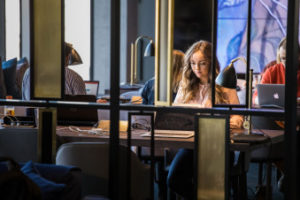
Business Link Astoria (Warsaw)
Every enterprise expecting dynamic growth on the market needs an ambitious strategy and to adopt emerging trends to achieve business success in a changing world. Investment in a new, rapidly growing real estate segment seems to be the natural step forward. Additionally, flexible spaces complement Skanska’s portfolio. This is not about creating a façade about a wide range of services – Business Link truly responds to the needs of other Skanska customers who, for example, underestimated the number of workplaces required or need to diversify their job portfolio, guaranteeing their employees the ability to choose a place at any time outside of the main office.
This is not about creating a façade – Business Link truly responds to the needs of other Skanska customers who, for example, underestimated the number of workplaces required.
Why did it make sense to Skanska to take full ownership, and not keep it as a joint-venture?
Synergy is the key word here – Skanska decided to take full advantage of cooperation with Business Link to more effectively combine a traditional developer’s space leasing operations with the offer of flex space. It is worth noting here that this situation is not frequently encountered – flex spaces are most often managed by relatively young entities without a well-established organizational culture, which is why we believe that Business Link can gain a lot by observing processes and models.
Flex spaces are most often managed by relatively young entities without a well-established organizational culture, which is why we believe that Business Link can gain a lot by observing processes and models.
Isn’t the move cannibalizing the traditional office long term lease market you are in too?
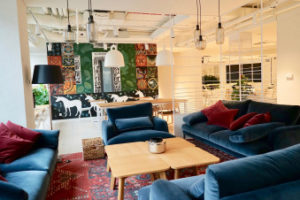
Business Link High5ive (Cracow)
Skanska offers excellent space for the entire company in a traditional lease formula. As Business Link, we supplement this portfolio by providing a more flexible product that can be used as the main office – a solution chosen by small companies, as well as larger teams exceeding a hundred people. An office such as this facilitates communication and enables efficient work coordination, whilst guaranteeing excellent conditions for all employees. We can also offer our clients a design office – used only for a specific time or an office dedicated to remote work outside the company’s main office. Diversification of office space within one organization is one of the most important office trends. Users of such a model are companies wishing to offer more flexibility than the one resulting from the possibility of remote work, e.g. from a home or a cafe.
Diversification of office space within one organization is one of the most important office trends.
What is “coworking 2.0” (name coined in some of your communication material)? Some other players would call themselves business center or serviced office…
Coworking today – in business terms – is an outdated model. Quite a bold statement, but reflected in the space designs of many players in this market. Please note that we can rarely find only open-space spaces or spaces only split up into private offices. Flex space is a model that combines these two formats. It is therefore a balancing act to allocate types of workplaces within the operator’s space – on one hand, in each location, responding to local demand, and on the other hand – ensuring financial viability of the location. It is difficult to build a community without having a penny.
Coworking today – in business terms – is an outdated model. Quite a bold statement, but reflected in the space designs of many players in this market.
You now speak a lot about ecosystem, engagement, green surroundings… Are hospitality and service more important than technology and facility, nowadays?
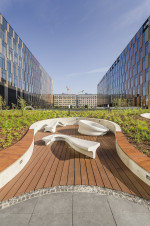
Business Link High5ive (Cracow)
Business Link today, above all, we think, has the largest customer service team on the market, providing comprehensive support and service at the highest level. Our offices are located in buildings that meet the highest environmental standards, and the design and equipment offered to customers allows for the enjoyment of green surroundings – from the walls, covered with reindeer lichen, affecting the humidity of the air, to green terraces, guaranteeing rest among greenery in the heart of the city . We don’t try to be the driving force behind our clients’ free time at all costs – we focus on quality, not quantity. We will sooner choose a live film music concert, rather than a mentoring/educational event so popular on this market. We strive to give tools that will allow our clients to organize the work and leisure of their employees at their own discretion.
We strive to give tools that will allow our clients to organize the work and leisure of their employees at their own discretion.
The real estate world is full of the WeWork name. How do you position yourself as opposed to that kind of big international player?
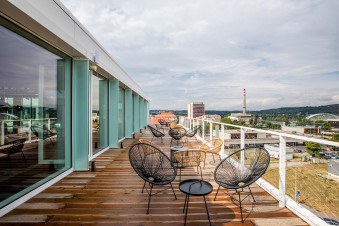
Business Link Visionary (Prague)
Business Link offers customers splendidly designed prestigious spaces with an impeccably prepared customer service team, the most numerous on the market. The key to our market success is an individual approach, investing in the professionalism of the team, and responding effectively to the needs of small and large companies. The Business Link strategy is based on building strong business foundations on local markets in Central and Eastern Europe (currently 4 locations in Poland, and 1 in the Czech Republic). We prefer to measure our success with customer satisfaction rather than with geographical coverage. This specific specialization allows us to cater to the needs of the market that we know perfectly well.
We prefer to measure our success with customer satisfaction rather than with geographical coverage.
What are the differences you see between Poland, the Czech Republic and the situation of coworking in Western Europe?
In the real estate segment, including office space, the markets of Central and Eastern Europe are still emerging markets. The stability of these markets, proven during the recent financial crisis, makes them a natural place for investment, guaranteeing high rates of return. The Western European market is more saturated, and some natural market processes – such as the fulfillment of regional demand – having inevitably appeared there before. In the Central and Eastern European markets, in the segment of flexible offices, Business Link is a precursor of the network approach, allowing for the creation of business synergies amongst the large regional cities. At the same time, we’re observing how increasing supply causes gradual segmentation of the market, allowing to meet the needs of various types of customers.
Are your plans limited to Central Europe or do you look beyond?
Our roots and specialization lie in the CEE region, which is why we would rather stay in our comfort zone.
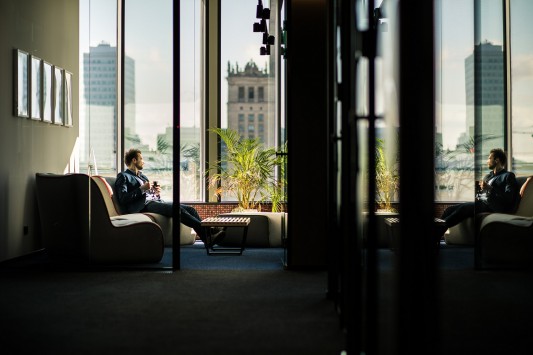

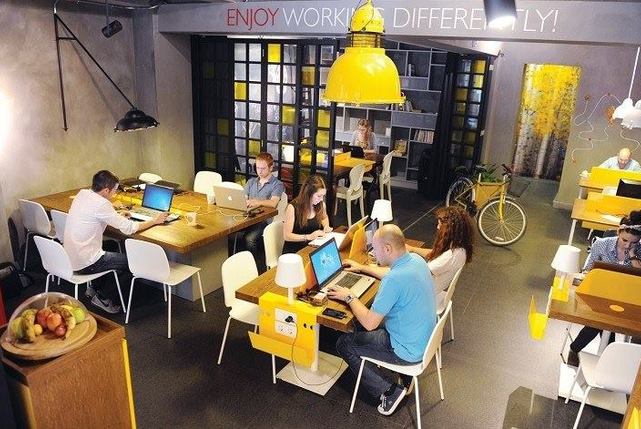
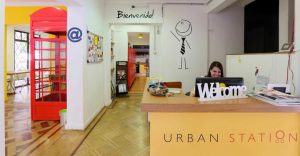
Recent Comments